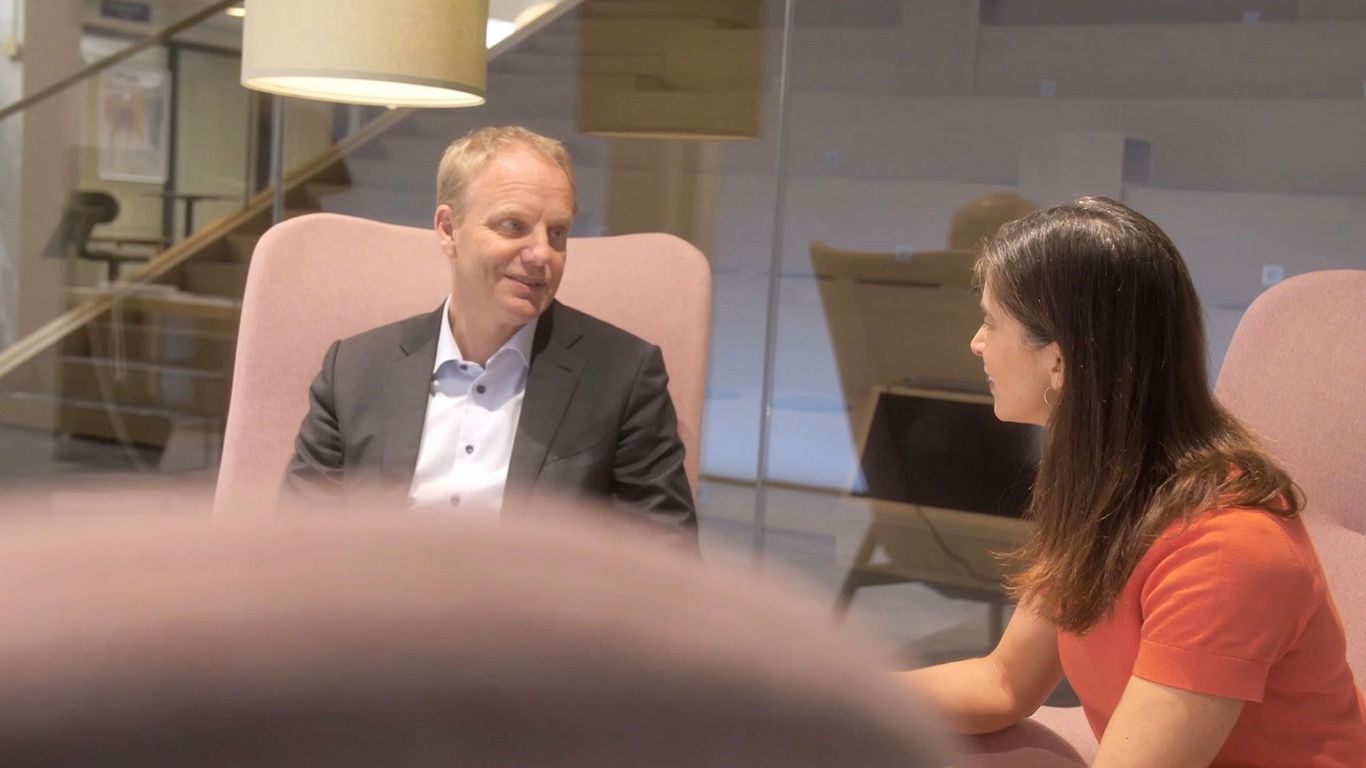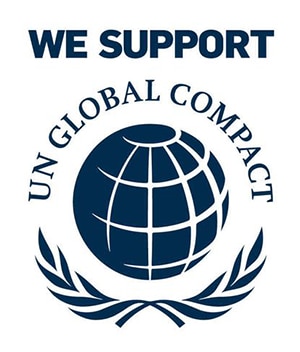
On a journey to become a truly sustainable company
The year summarized by Jonas Samuelson (JS), President and Chief Executive Officer, and Vanessa Butani (VB), VP Group Sustainability.

How is the Electrolux sustainable strategy being deployed throughout the business?
JS: We're working to make sure that everything we do takes us on a journey to become a truly sustainable company.
VB: At Electrolux, sustainability isn't an afterthought or an add-on, and our strategy reflects this. Sustainability is an integral part of everything we do, from gathering consumer insights, developing products, sourcing, supply chain and production, branding and marketing, and how the consumer experiences our products and connects with us in a long-term relationship.
How important is the Electrolux For the Better 2030 sustainability framework?
JS: For the Better 2030 provides us with a guiding framework for our journey to achieve a Better Company, Better Solutions and Better Living within society and to achieve our Climate Goals, ultimately to become climate neutral throughout our value chain by 2050. We remain unique in not just becoming a better company with better solutions, but in also taking the next step in setting targets to enable consumers to live better and more sustainable lives.
VB: Our work with sustainability makes us stand out as an industry leader. We've always helped consumers, but now we help them live more sustainably too. This is our ticket to win – and I would also say our ticket to the future.
Tell us about the main milestones and progress to a climate neutral value chain by 2050?
JS: Important milestones on our climate roadmap to climate neutrality by 2050 are our science-based targets to reduce carbon emissions in our operations by 80% and emissions from our products by 25% by 2025 compared with 2015. In our operations, we achieved a reduction of 78% in our carbon emissions last year. We are well positioned to achieve our target for climate neutrality in our operations by 2030 target.
VB: In our operations, we are continuing to switch to renewable energy, electrifying high-energy processes, ensuring better energy management. The roll out of our Zero Waste to Landfill program helped to recycle or reuse over 97% of waste across all our sites as we work toward climate neutral operations. Our SEK 8bn re-engineering investment program is crucial to modernize and optimize our operations to meet our climate objectives.
How is Electrolux working to reduce the environmental impact of its products?
JS: Household appliances account for almost 30%1) of global energy consumption in the home and product usage generates approximately 85% of our total value chain CO2 emissions. Therefore, we have an important opportunity to develop efficient appliances that save energy throughout their lifespan in people's homes.
VB: We work hard to innovate and make our products as sustainable as possible throughout their lifetime. We do this by making our products increasingly resource efficient and circular, and by helping consumers to use their appliances in the most efficient way.
What exciting sustainability product innovations were launched during the year?
VB: We have continued to make good progress in energy and water efficiency and in incorporating more sustainable materials into our products. The NutriFresh inverter refrigerator maintains a stable temperature, minimizes water loss and provides higher humidity to keep food fresh longer while using one third less energy than other refrigerators on the market. Our patented Care Drum is a "cushion-like" drum pattern for clothes to softly glide on – to provide significantly gentler fabric care by reducing wear and tear on garments. The slim design of our Pure 4X water purifier developed by Electrolux Latin America reduced plastic in each product by 27% and each filter provides 3,000 liters of purified water, effectively saving 6,000 half-liter plastic bottles.
How is Electrolux helping consumers live more sustainably?
JS: We have a vital role in making societies more sustainable – not only delivering more sustainable products to the market, but also ensuring consumers know how to use their products sustainably through initiatives and campaigns. We are increasingly developing products that help consumers to live better and more sustainable lives by changing their behavior for the better.
VB: Helping consumers reduce food waste is one of our focus areas such as by introducing solutions to prolong the freshness of food, such as refrigerator crispers that provide the best humidity and temperature control to make fruit and vegetables last longer. We also promote healthier and more sustainable ways of cooking, with solutions such as steam cooking and air frying, and are developing a connected refrigerator camera that suggests what people can cook based on the ingredients they have. The Electrolux Food Foundation launched Replate.com – a website with loads of great information on how we can all eat more sustainably.
How did you engage with young people during the year?
JS: Through an international survey, we engaged with thousands of young people around the world to help shape our product innovation over the coming years. We want to listen to young people who will be starting up their own homes in the coming years to be able to provide solutions tailored to their needs. We also created a team of eight young people from seven countries who are passionate about sustainability to advise our innovation teams.
How important is internal and external collaboration for sustainability at Electrolux?
JS: From an internal perspective, we need all our 52,000 people to be our sustainability ambassadors. This is about leadership, ensuring we all have the facts, cross departmental collaboration and looking forward – to get everyone behind us. Internal collaboration on sustainability will help us to thrive and become more profitable.
VB: But we can't do this alone. We also need to collaborate with external partners so we can accelerate our work and learn together. For example, we worked with Stena Recycling during the year to develop a prototype vacuum cleaner that is 90% recyclable. Listening to our consumers is also important to meet their needs with more sustainable products.
What role does Electrolux play in a world with great sustainability challenges?
JS: We continue to make good progress on sustainability, but let's be clear – the global sustainability situation is urgent, and all businesses must do more. At Electrolux, we have a huge responsibility to deliver more sustainable solutions to society, which at the same time is a huge business opportunity for us.
VB: As a company present in millions of homes around the world, we know we have a significant impact, which means that we can also play a significant part in the de-carbonization of our planet to limit the consequences of climate change. We're committed to play our part and to inspire consumers and the communities around us. For instance, I'm proud of the work of the Electrolux Food Foundation to inspire kids, adults and chefs to eat and cook more sustainably, train underprivilege people to enter the food labor market and help people in need through our partnership with the Red Cross.
How does For the Better 2030 align with the global sustainability agenda?
JS: We strive to be an industry leader in driving sustainable development. The basis for our leadership is the fact that we are a long-term signatory of the UN Global Compact and its ten principles related to human rights, labor, environment and anti-corruption.
VB: Our sustainability work contributes to select UN SDGs. We also engage in many external initiatives around important topics, such as calling for action on water with the WWF, phasing out high-impact greenhouse gases in our appliances as part of our commitment to the United Nations Cool Coalition initiative, and collaborations with other multinational companies.
How is Electrolux scaling up the more circular use of materials and circular business models?
JS: We are very much driving toward the concept of circularity and one way we can contribute is to use recycled materials in our products and make our products recyclable. We are already a circularity leader in our industry with a goal to use 50% recycled plastic by 2030 and to increase our use of scrap-based steel.
VB: We are also developing and rolling out more circular business models around the world. These include appliance trade-in programs where consumers can have their old appliance collected for recycling when their new product is delivered, our fixed-price repair services and our various leasing services.
What is the next step in the For the Better 2030 framework?
VB: We need to use sustainability as a differentiator. We've got the tools, the people and the conviction to meet our ambitious goals. So we just need to get out there and do it.
1) International Energy Agency report, www.iea.org/reports/appliances-and-equipment